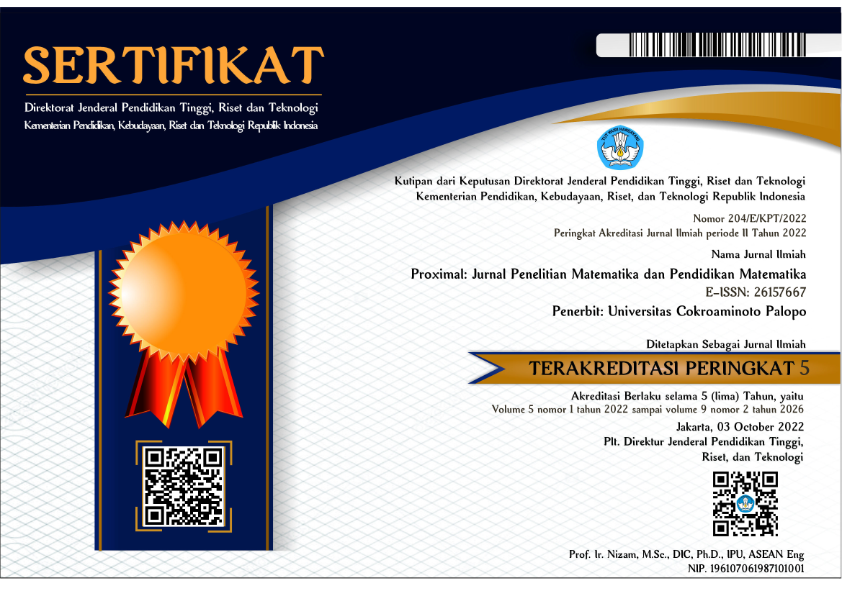Efektivitas Model Kooperatif Tipe STAD Berbasis Komputer Terhadap Prestasi Belajar Matematika Siswa SMK Negeri 4 Palopo
Keywords:
Model Kooperatif, Prestasi Belajar Siswa, STADAbstract
Jenis penelitian ini merupakan penelitian eksperimen. Pengambilan sampel menggunakan teknik STAD. Satuan eksperimen dalam penelitian ini yaitu siswa kelas XI TKJ SMK Negeri 4 Palopo. Pengambilan data dilakukan dengan menggunakan tes uraian sebelum pembelajaran dan posttest setelah pembelajaran dengan menggunakan model pembelajaran kooperatif tipe STAD. Instrumen yang digunakan dalam penelitian ini adalah tes prestasi belajar siswa dan keterampilan mengajar guru, serta angket sikap dan respon siswa. Satuan eksperimen dalam penelitian ini yaitu seluruh siswa kelas XI SMK Negeri 4 Palopo dan yang menjadi perlakuan adalah siswa kelas XI TKJ SMK Negeri 4 Palopo tahun 2018/2019. Dalam penelitian ini pengambilan sampel menggunakan teknik random sampling dengan mengambil secara acak dan langsung satu kelas dari seluruh kelas XI yang ada di SMK Negeri 4 Palopo. Analisis yang digunakan adalah statistik deskriptif dan statistik inferensial sehingga diperoleh rata-rata hasil prestasi belajar siswa lebih baik setelah diterapkan model pembelajaran STAD.
Downloads
References
Agus, Suprijono. (2009). Cooperative Learning. Yogyakarta: Pustaka Pelajar.
Budiarjo, Lily (2008) Keterampilan Belajar. Yogyakarta: Penerbit ANDI
Djamarah, M. (1989). Strategi Belajar Mengajar. Jakarta: Rineke Cipta.
Goleman, Daniel. (2000). Working With Emotional Intelligence (terjemahan). Jakarta : PT. Gramedia Pustaka Utama.
James dan James, Van. (1976). Mathematic Dictionary. Nosrand Riendhold.
Johnson dan Rising. (1972). Math On Call: A Mathematics Hanbook, Great Source Education Group, Inc.
Kline, (1973). Matematika SD. http:Pembelajaran Matematika disekolah dasar SD. Diakses tanggal 01 Mei 2012.
Nana Sudjana. (2006). Penilaian Hasil Proses Belajar Mengajar. Bandung: Remaja Rosdakarya.
Nur Asma. (2006). Model Pembelajaran Kooperatif. Jakarta: Depdiknas.
Nurkencana, Wayan. (1982). Evaluasi Pendidikan. Surabaya: Usaha Nasional.
Reys, dkk. (1984). Dasar-Dasar Matematika Matematika. Jakarta: Bumi Aksara.
Sudjana. (2005). Penilaian Hasil Proses Belajar Mengajar. Bandung: PT. Remaja Rosdikarya.
Tinggih, Elea, (1972). Pengertian Matematik. Yogyakarta: Perpustakaan Digital Universitas Malang.
Trianto. (2009). Mendesain Model Pembelajaran Inovatif-Progresif. Surabaya: Kencana.
Wicaksono, Yogi. (2008). “Manajemen Sumber Daya Manusia untuk Perusahaan”. PT. Remaja Rosda Komputindo, Jakarta.
Downloads
Published
How to Cite
Issue
Section
License
In submitting the manuscript to the journal, the authors certify that:
- They are authorized by their co-authors to enter into these arrangements.
- The work described has not been formally published before, except in the form of an abstract or as part of a published lecture, review, thesis, or overlay journal.
- That it is not under consideration for publication elsewhere,
- That its publication has been approved by all the author(s) and by the responsible authorities – tacitly or explicitly – of the institutes where the work has been carried out.
- They secure the right to reproduce any material that has already been published or copyrighted elsewhere.
- They agree to the following license and copyright agreement.
License and Copyright Agreement
Authors who publish with this journal agree to the following terms:
- Authors retain copyright and grant the journal right of first publication with the work simultaneously licensed under Creative Commons Attribution License (CC BY 4.0) that allows others to share the work with an acknowledgment of the work's authorship and initial publication in this journal.
- Authors are able to enter into separate, additional contractual arrangements for the non-exclusive distribution of the journal's published version of the work (e.g., post it to an institutional repository or publish it in a book), with an acknowledgment of its initial publication in this journal.
- Authors are permitted and encouraged to post their work online (e.g., in institutional repositories or on their website) prior to and during the submission process, as it can lead to productive exchanges, as well as earlier and greater citation of published work.















